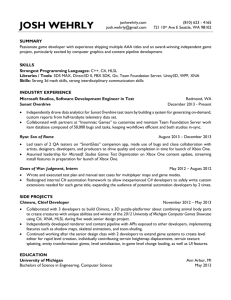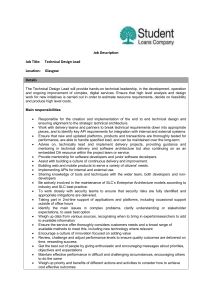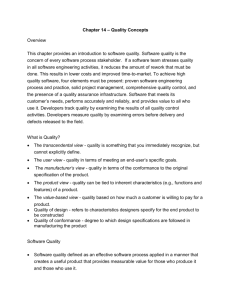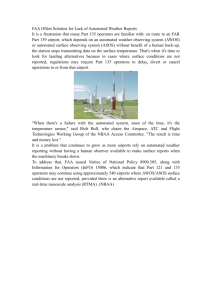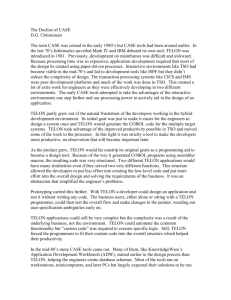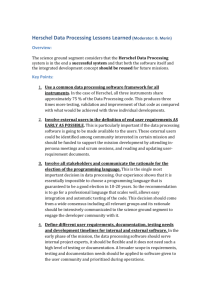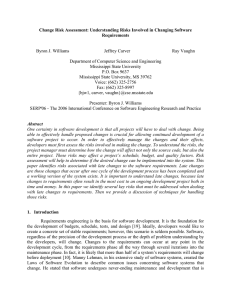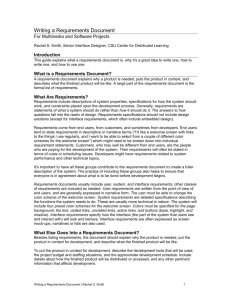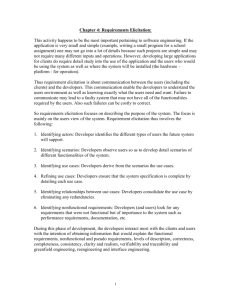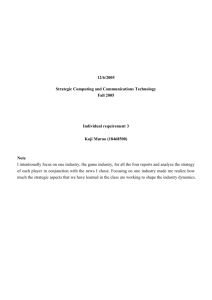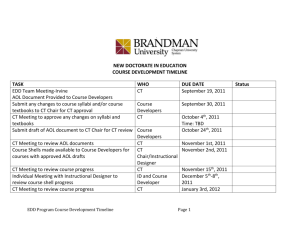Other Advantages of Information Technology
advertisement
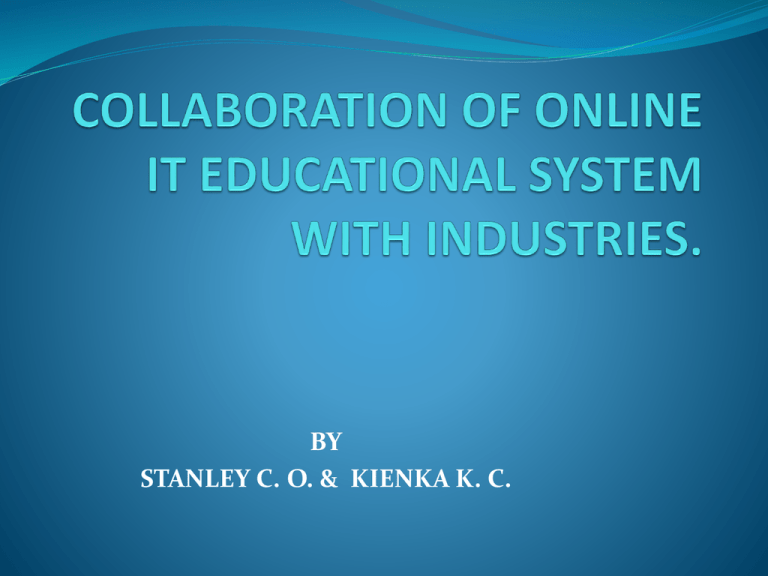
BY STANLEY C. O. & KIENKA K. C. Evolution of I.T in companies Information Technology has been so significant that no company can survive in this modern day without it. I.T created a room for companies to validate, catch, simulate and manipulate data to any meaningful information in a very short time. I.T started taking more grounds in the early 90’s when schools and business facilities like banks etc. The early form of I.T was used by only military during wars and scientist created it based on some military specifications needed to encrypt data, calculate geographical mappings and defense and attacking features. Since after the World war most technology developed during the world war has been used in different nations to improve the non-military sectors and the focus turned to a business orientation perspective. Eg.(machines used during the war which was later used after the war for the people) I.T in our modern day Information Technology has grown so badly that every company in our recent days has a Department which is referred to as “I.T department”. As far as computers survive information Technology becomes more and more vital. These are some Areas which I.T has shown its importance. Information Technology has shown herself in diverse fields of interest making it a big motivation and influence to modern day technology .schools, banks and many core areas are making more researches and education to enhance their staff or student to meet up with technology and speed up I.T development in their various fields .nowadays we are faced with E-learning E-Commerce E-mails E-banking E-Verification E-meetings (Conferencing and chartrooms) E-Survey Internet has been a working tool of Information Technology which defines the Ideology of Multitasking and being in two places at the same time making business procedures to speed up rapidly. Many other tools like the evolution of hardware and software to influence the external procedures .for example the amount computers or versions of software that are available to satisfy general and special needs of various organizations. I.T , Developers, Operator and Clients Information Technology has created Diverse Job opportunities where by giving chance to various companies to create computers hardware and software or even creations of peripherals . Developers: Developers of are constantly of different types which we have example are the web developers, Hardware Developers and software Developers which were referred to as the Scientist in those days of the cold war eg IBM, Microsoft, Bell, W3 consortium. Operators : Operators in I.T world are those people who spend quality time learning what the Developers have created or invented , the operators are the Validators or senior users of this systems and learn the various flexibilities of this System created. Sometimes these operators could be end users or clients Clients: Are also referred to as End-Users, these are individuals who are the focus when a system is created. They are the Primary Users. In the past years Companies have spent so much trying to educate people or clients on how to blend with the Spices of information technology. With technology at a very fast pace nowadays not everybody could chase the various subdivisions’ of I.T. Which are mentioned below? System Analysis and Design Different Programming Techniques Database structures and administration Analysis of All Forms of Algorithms Networking Technologies Positive and Negative Impact of I.T in Recent Days Information Technology has some really positive dimensions and also Negative dimensions which will be addressed below. Positive Impact Storing and Protecting Information Information technology creates electronic storage systems to protect your company's valuable records. According to the Graziadio Business Report, published by Pepperdine University, secure maintenance of customer and patient files is vital to business integrity. Storage systems, such as virtual vaults, keep information safe by only allowing certain users within your company to access, withdraw, add or change the documents. According to an article in Science Daily, IT security engineering systems protect your electronic information from being hacked, or wiped out during a technological disaster. Electronic security engineering means your valuable records will remain untouchable. Automated Processes In business, people look for ways to do more work in a shorter amount of time. A November 2000 newsletter published by the Federal Reserve Bank of San Francisco explains that information technology improves your company's efficiency by developing automated processes to take burden off your staff. In turn, your employees are free to work on other things while the computer runs their reports, creates queries, tracks projects and monitors financials. Work Remotely IT systems give you remote access to your company’s electronic network, so that you can work from home or on the road. This accessibility allows you to increase your productivity because you can still get work done, even when you aren’t physically in the office. Communication Communication is essential to the business world, and information technology gives your company the resources it needs to communicate quickly and effectively. Your IT department can hook your employees up with email, video conferencing equipment and internal chat rooms, so that they always have an efficient way to conduct business and communicate. Other Advantages of Information Technology: The advantages of information technology are many. True globalization has come about only via this automated system. The creation of one interdependent system helps us to share information and end linguistic barriers across the continents. The collapse of geographic boundaries has made the world a 'global village'. The technology has not only made communication cheaper, but also possible much quicker and 24x7. The wonders of text messages, email and auto-response, backed by computer security applications, have opened up scope for direct communication. Computerized, internet business processes have made many businesses turn to the Internet for increased productivity, greater profitability, clutter free working conditions and global clientèle. It is mainly due to the IT industry that people from diverse cultures are able to personally communicate and exchange valuable ideas. This has greatly reduced prejudice and increased sensitivity. Businesses are able to operate 24x7, even from remote locations. Information technology has rippled on in the form of a Communication Revolution. Specialists in this field like programmers, analyzers and developers are able to further the applications and improve business processes simultaneously. The management infrastructure thus generated defies all boundaries. Among the many advantages of the industry are technical support post-implementation, network and individual desktop management, dedicated business applications and strategic planning for enhanced profitability and effective project management. IT provides a number of low-cost business options to tap higher productivity with dedicated small business CRM and a special category for the larger operations. Regular upgrades have enabled many businessmen to increase productivity and identify a market niche that would never have been possible without the connectivity. With every subsequent increase in the ROI or Return On Investment, businesses are able to remain buoyant even amidst the economic recession. Not only do people connect faster with the help of information technology, but they are also able to identify like-minded individuals and extend help, while strengthening ties. Negative Impacts Implementation Expenses Every business must consider startup costs when implementing any type of information technology system. In addition to the cost of hardware and software, some technology vendors require businesses to purchase user licenses for each employee that will be operating the system. Businesses must examine the cost of training employees in unfamiliar technology. Although basic information technology systems may be user friendly, advanced programs still require formal instruction by an expert consultant. In addition to the startup expenses, information technology systems are expensive to maintain. Systems malfunction, and when they do, businesses must engage skilled technicians to troubleshoot and make the necessary repairs. These expenses present a major disadvantage of information technology in business, particularly to businesses that are entering the technology era for the first time. Job Elimination Implementing information technology into business operations can save a great deal of time during the completion of daily tasks. Paperwork is processed immediately, and financial transactions are automatically calculated. Although businesses may view this expediency as a boon, there are untoward effects to such levels of automation. As technology improves, tasks that were formerly performed by human employees are now carried out by computer systems. For example, automated telephone answering systems have replaced live receptionists in many organizations. This leads to the elimination of jobs and, in some cases, alienation of clients. Unemployed specialists and once-loyal employees may have difficulty securing future employment. Security Breaches The ability to store information in an electronic database facilitates quicker, more efficient communication. In the past, an individual would sift through stacks of paper records to retrieve data. With properly implemented technology, information can be recovered at the touch of a button. Although information technology systems allow business to be conducted at a faster pace, they are not without their flaws. Information technology systems are vulnerable to security breaches, particularly when they are accessible via the Internet. If appropriate measures are not in place, unauthorized individuals may access confidential data. Information may be altered, permanently destroyed or used for unsavory purposes. Unemployment - While information technology may have streamlined the business process, it has also crated job redundancies, downsizing and outsourcing. This means that a lot of lower and middle level jobs have been done away with, causing more people to become unemployed. Privacy - Though information technology may have made communication quicker, easier and more convenient, it has also brought along privacy issues. From cell phone signal interceptions to e-mail hacking, people are now worried about their once private information becoming public knowledge. Some disadvantages of information technology include: Lack of job security - Industry experts believe that the internet has made job security a big issue, since technology keeps on changing with each day. This means that one has to be in a constant learning mode, if he or she wishes for their job to be secure. Dominant culture - While information technology may have made the world a global village, it has also contributed to one culture dominating another weaker one. For example, it is now argued that US influences how most young teenagers all over the world now act, dress and behave. Languages too have become overshadowed, with English becoming the primary mode of communication for business and everything else. Speculations of I.T in few Decades to come Future technology information technology would stand for all of continuously evolving and converging information technologies, including digital convergence, multimedia convergence, intelligent applications, embedded systems, mobile and wireless communications, bio-inspired computing, grid and cloud computing, semantic web, user experience and HCI, security and trust computing and so on, for satisfying our ever-changing needs. Our conference is intended to foster the dissemination of state-of-the-art research in all future IT areas, including their models, services, and novel applications associated with their utilization. In past twenty five years or so, Information Technology (IT) influenced and changed every aspect of our lives and our cultures. Without various IT-based applications, we would find it difficult to keep information stored securely, to process information efficiently, and to communicate information conveniently. In the future world, IT will play a very important role in convergence of computing, communication, and all other computational sciences and application and IT also will influence the future world's various areas, including science, engineering, industry, business, law, politics, culture, medicine, and so on. Organization and I.T relationship Pharmaceutical and Medical area Construction and Manufacturing Industries Sales and Advertising agencies Banking and Finance sectors Agricultural and raw materials Telecommunication Governmental and Non-governmental sectors Education Architecture Tourism Human Security and Safety THANK YOU FOR LISTENING


